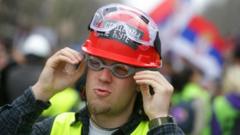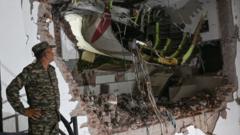In response to the devastating collapse at Novi Sad station that resulted in 15 fatalities, tens of thousands of protesters have flooded Belgrade, rallying for government accountability and reforms. The protests, described as possibly the largest in Serbia's history, are fueled by long-standing dissatisfaction with corruption and mismanagement under President Aleksandar Vucic's leadership.
Massive Anti-Government Protests Erupt in Serbia Following Station Collapse

Massive Anti-Government Protests Erupt in Serbia Following Station Collapse
Tens of thousands gather in Belgrade demanding justice and accountability after a tragic railway station disaster that claimed 15 lives, igniting public anger toward the government.
Tens of thousands of Serbians took to the streets of Belgrade on Saturday, marking one of the largest anti-government demonstrations in the country's history. This outpouring of public sentiment was spurred by the tragic collapse of a railway station roof in Novi Sad last November, which resulted in the deaths of 15 people. Government reports cite attendance at around 107,000, while independent monitors and organizers are still assessing the actual turnout, which underscores the gravity of public outrage.
The tragedy has become a rallying point against President Aleksandar Vucic's administration, with many protesters attributing the catastrophe to systemic corruption and negligence fostered over a decade of governance by his Progressive Party. Vucic’s ties to the recently renovated station only intensify public grievance, leading to escalating demands for accountability and reform.
Republic Square in Belgrade brimming with protesters was just one of the multiple meeting points for the "15th for 15" march, which symbolizes the 15 victims of the disaster. Students, taxi drivers, farmers, and members of various professions are uniting under the banner of reform, reflecting widespread frustration with the state of Serbian institutions. “We just want a country that works,” declared law student Jana Vasic, echoing a sentiment felt across the crowd. Calls for transparency and a thorough investigation into the renovation of the Novi Sad station persist as demonstrators press for significant changes.
The protest movement has gained momentum since it began primarily with student activists. Advocacy for accountability has seen them demand the release of all documentation related to the station renovation, as the government’s current disclosures have not satisfied their inquiries. So far, at least 16 individuals have been indicted, including former construction minister Goran Vesic, but the public remains unwarmed by mere indictments without trials.
Amidst the surge in protests, Serbian Prime Minister Milos Vucevic resigned in January, though he remains in office pending assembly approval. Meanwhile, President Vucic has remained defiant, rejecting calls for his resignation and expressing that he will not be swayed by public demonstrations. “I won’t allow the street to pave a horrible future for this country,” he stated, downplaying the significance of the protests.
The discontent has drawn in opposition leaders who discuss the potential formation of an expert government to spearhead reforms and pave the way for new elections—though this does not align with the protesters' immediate demands. They seek essential accountability and adherence to the rule of law, leaving little room for compromise. As the "15th for 15" protests progress, it appears that the participants will continue their fight for deeper institutional reforms, making their voices heard until satisfactory solutions are reached.




















